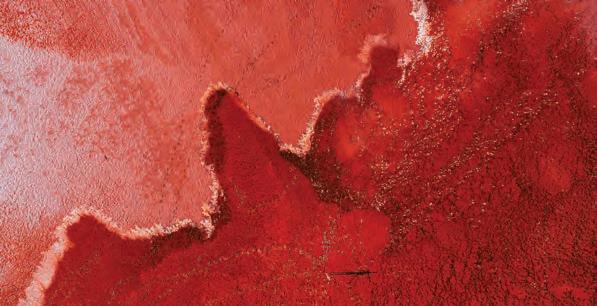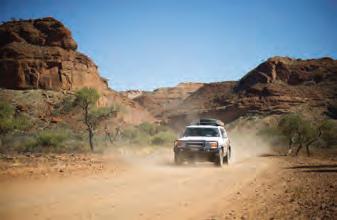
4 minute read
Top Travel Tips
Top travel tips for explorinG AustrAliA’s Golden outbAck
If you are new to wandering out yonder here are some tips from the experts at Western 4W Driver.
prepArAtion is AlWAys key to A successful trAvel Adventure. here Are soMe thinGs to beAr in Mind:
Make sure you get your vehicle serviced before you depart. This ensures that you don’t experience any costly mechanical surprises when travelling.
Share your plans. Let someone you trust know where you are going and when you are planning to return.
No one has starved to death in the Australian outback in recent history; however plenty have perished through lack of water. Plan on carrying two to four litres per person, per day between destinations. Avoid sipping water, always have at least a cup full when drinking (sipping only satisfies the desire to drink for a short while but does not get the fluid into your body where it is needed).
If you breakdown or get stuck somewhere, stay with your vehicle. It is easier to find a vehicle than it is a person. Stick your bonnet up so that any vehicle that is driving past can see that you are broken down.
Always carry a first aid kit. Ensure any items you use are replaced as soon as possible. Check current road conditions prior to departure by going to travelmap. mainroads.wa.gov.au/Home/Map. If you are planning a route that is not a major road, it’s also a good idea to check with a local road house or local visitor centre before departure.
Learn how to operate your vehicle safely by completing a 4WD course. Learn from the experts how to drive your 4WD off-road, how to recover yourself when you get stuck and become more confident when travelling along remote roads. here Are soMe hAndy iteMs you should hAve on boArd:
Buy yourself a good quality, 12-volt air compressor. You will need it if you want to drive on sand or corrugated roads. When pumping tyres back up, check how hot the compressor is getting and maybe let it cool down a little between tyres.
Stay on track. Don’t rely on Google Maps to get you to where you are heading. You will have limited mobile

signal and many tracks and back roads are not shown. Google will also avoid gravel roads where it can so it may take you on a route longer than it needs to be. Invest in a good quality GPS and have a paper map or road atlas as a backup. We recommend getting your hands on a HEMA HX-2, great for on and off-road navigation.
If you haven’t already, install a UHF radio in your vehicle and learn how to use it. When travelling on the highways, tune into channel 40. You can easily communicate with other road users, particularly the truckies. Don’t be afraid to talk to them if you are trying to overtake. Keep your conversations brief and to the point so that others can use the channel.
Bring cash with a range of notes and change. Don’t rely on internet being available to run eftpos and your Apple iPay as you travel.
Get yourself some prepaid mobile cards. Telstra has the best regional coverage but Optus is best through our National Parks so having both available is a good idea. It’s important to activate them before departing when data is easily accessible.
If you brought it with you, take it with you. Keep our beautiful country as pristine as possible. Take all your rubbish with you. Rubbish bins can be scarce or not emptied very often. Get yourself a dirty gear bag to hang off your spare wheel and put your rubbish (and any you find) in it. Empty it when you come into town.
soMe drivinG tips:
AWD or 4WD. Many SUV’s are constant AWD. That doesn’t make them 4WD. When you are on gravel, engage 4WD to ensure better road handling and stability. Make sure you switch back to either 2WD or AWD before you are back on the bitumen otherwise you can do serious damage to your vehicle.
It’s a popular myth that you need to drive as fast as possible to get a smooth ride where there are corrugations. This is NOT TRUE. Driving fast over corrugations limits the contact your vehicle has with the ground (you are effectively skipping over the corrugations), resulting in less control and the possibility of a serious accident. If that isn’t enough to dissuade you then feel your shock absorbers. If they are too hot, then you are driving too fast. If you continue, it won’t be long until your suspension suffers a catastrophic failure. Drop your tyre pressure and reduce your speed.
dAily vehicle check (p.e.t.r.o.l)
PETROL (or fuel type for your vehicle).
ELECTRICITY – battery condition. Check fluid levels
TYRES Check tyre pressure, look for bulges, tread damage etc
RADIATOR Check the coolant level via the overflow reservoir. Check the washer bottle level.
OIL Use the dip stick to check engine oil levels
LIGHTS Check headlights, indicators etc
Scan here for more travel tips and information
Your holiday starts now.
Kick back, relax and discover regional WA on Transwa’s modern Prospector train. We travel between Perth and Kalgoorlie 18 times weekly, enjoy on-demand entertainment and buffet service whilst travelling in comfort.
Transwa also operates luxury road coaches between Kalgoorlie and Esperance six times weekly, all services are air conditioned and fully accessible, equipped with on-board entertainment, bathroom facilities and USB charging ports.
To book your next holiday, or to see where Transwa can take you call 1300 662 205 or visit transwa.wa.gov.au.









